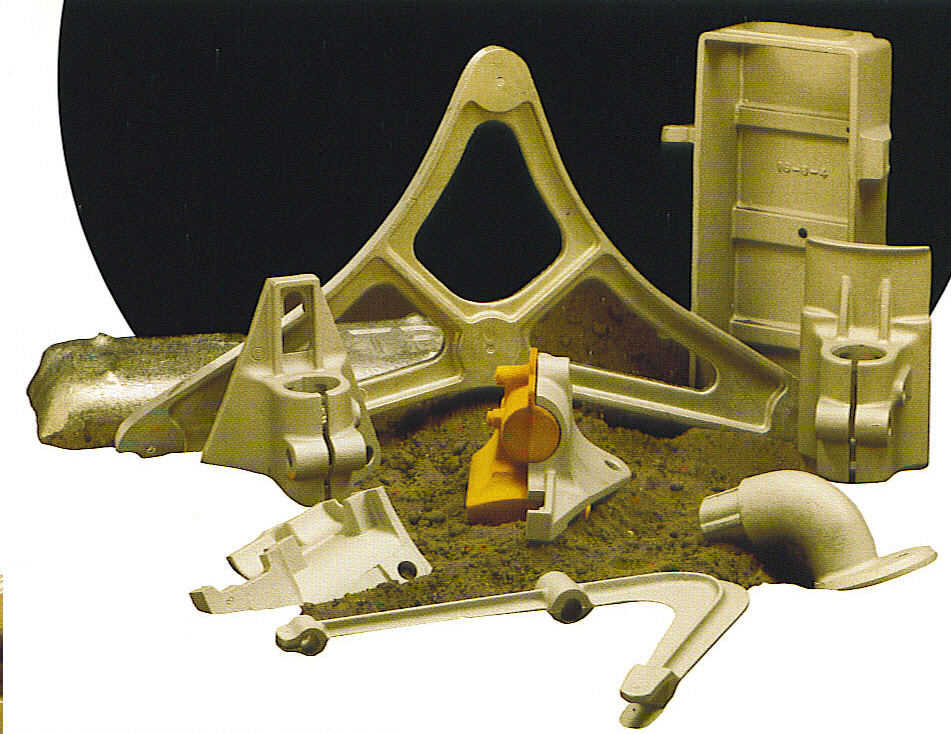The role of Aluminum Castings in high-tech applications
Wiki Article
The Crucial Uses Aluminum Foundry in Different Industries and Their Influence
Aluminum shops act as a vital source within countless sectors. Their resilient and light-weight products considerably boost efficiency in automotive, aerospace, building, and electronic devices markets. As each sector leverages light weight aluminum's one-of-a-kind residential properties, they additionally add to sustainability initiatives. This diverse effect triggers a deeper exploration of how Aluminum shaped these sectors. What specific innovations and benefits emerge from its usage?Automotive Sector Applications
The vehicle market significantly relies upon Aluminum Foundry applications to boost lorry efficiency and effectiveness. Aluminum's lightweight nature adds substantially to sustain economic climate, making it a preferred choice for suppliers intending to decrease emissions and boost total car dynamics. Elements such as engine blocks, transmission housings, and wheels are typically generated via Aluminum casting procedures, permitting for intricate layouts that fulfill strenuous safety and security and performance standards.
Aerospace Innovations

Furthermore, making use of aerospace-grade Aluminum alloys boosts resistance to deterioration and tiredness, crucial for the requiring atmospheres aircraft face. Developments in additive manufacturing additionally permit for fast prototyping and customization of parts, lowering lead times and costs.
Building and construction and Framework
While the building and infrastructure fields remain to evolve, Aluminum shops are progressively recognized for their payments to modern structure practices. Light weight aluminum's lightweight nature and high toughness make it a suitable material for different structural applications. Factories provide elements such as beams, frameworks, and frontages that boost the toughness and durability of structures and infrastructure jobs.Light weight aluminum's deterioration resistance plays a vital duty in prolonging the life-span of frameworks revealed to severe environmental conditions. The power efficiency of Aluminum products additionally aligns with sustainable building campaigns, adding to reduced energy consumption in construction. Furthermore, innovative casting techniques have actually increased the design opportunities, allowing designers and engineers to produce cosmetically pleasing yet functional structures.
Electronic devices Production
Aluminum shops play a significant role in the electronics manufacturing market, where the need for lightweight and thermally conductive materials is critical. Wisconsin Aluminum Foundry. Elements such as warmth sinks, casings, and braces are commonly generated making use of Aluminum as a result of its excellent thermal homes and capability to dissipate warm successfully. This is crucial in digital gadgets, where overheating can result in failure and reduced performanceThe versatility of Aluminum enables intricate layouts and exact machining, which are necessary in contemporary electronic devices. In addition, aluminum's non-magnetic homes make it appropriate for applications in delicate electronic equipment, lessening interference. Furthermore, aluminum's resistance to corrosion boosts the longevity of digital components, ensuring long life and dependability.
Sustainability and Reusing Efforts
Offered the boosting emphasis on ecological responsibility, the Aluminum Foundry sector has made substantial strides in sustainability and recycling initiatives. Aluminum is inherently recyclable, permitting foundries to redeem and reuse product with minimal power expenditure compared to key production. This closed-loop recycling procedure not only minimizes waste but likewise lowers greenhouse gas discharges, adding to a much more lasting manufacturing design.Moreover, numerous factories are taking on energy-efficient technologies, consisting of eco-friendly energy resources, to power their procedures (Metal Castings). This change not just decreases reliance on fossil fuels yet also enhances general functional performance
Industry partnerships are additional advertising sustainable techniques, such as sharing ideal methods and developing innovative recycling approaches. By focusing on these initiatives, the Aluminum Foundry industry is positioning itself as a leader in sustainable production, straightening with international targets for sustainability while fulfilling the needs of various industries.

Frequently Asked Questions
What Are the Primary Benefits of Making Use Of Aluminum in Foundry Processes?
The key advantages of utilizing Aluminum in Foundry processes include its lightweight nature, excellent corrosion resistance, high thermal and electric conductivity, and convenience, enabling complex styles and efficient recycling, eventually improving overall manufacturing performance and minimizing expenses. - Aluminum CastingsHow Does Aluminum Foundry Influence Product Lifecycle Management?
Aluminum Foundry greatly boosts product lifecycle management by making it possible for effective material usage, minimizing waste, and facilitating recycling. Its light-weight buildings enhance transportation performance, while sturdiness extends item lifespan, inevitably contributing to sustainability and cost-effectiveness in production.Are There Specific Difficulties in Aluminum Foundry Production?
Certain challenges in Aluminum Foundry manufacturing include handling temperature control, making sure material high quality, minimizing waste, and adapting to rising and fall market demands. These variables can influence efficiency, expense, and general competitiveness within the sector.What Safety And Security Actions Are Vital in Aluminum Foundry Procedures?
Vital safety and security procedures in Aluminum Foundry operations include individual protective devices, correct ventilation, normal devices upkeep, risk interaction, and emergency situation response training. Carrying out these techniques guarantees worker safety and reduces dangers connected with high-temperature steel handling.How Does the Expense of Aluminum Contrast to Various Other Steels in Foundry Usage?
get more info The expense of Aluminum is normally less than that of steels like copper and titanium, making it a cost-efficient choice for many Foundry applications. This affordability adds to its widespread usage throughout different markets.Aluminum factories serve as a vital source within many markets. The automobile industry increasingly relies on Aluminum Foundry applications to enhance lorry efficiency and effectiveness. The material's recyclability also aligns with the sector's press towards sustainability, as recycled Aluminum requires considerably much less energy to process contrasted to key light weight aluminum. Aluminum foundries play a significant role in the electronic devices producing industry, where the need for lightweight and thermally conductive products is vital. Provided the increasing focus on environmental duty, the Aluminum Foundry market has made substantial strides in sustainability and reusing efforts.
Report this wiki page